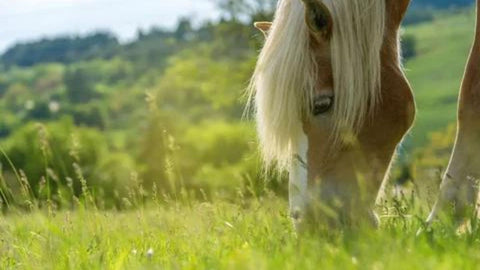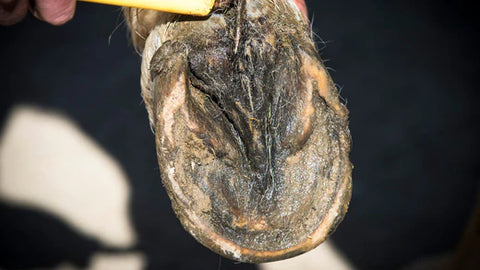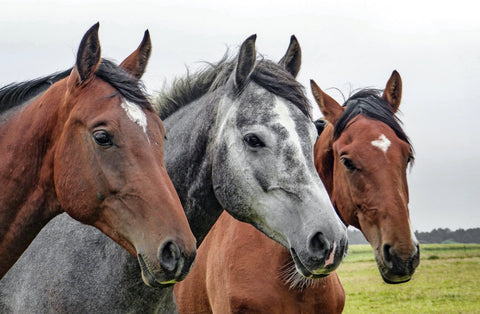
Florian ist aufgewachsen auf einem Bauernhof. Umgeben von Pferden, entdeckte er früh seine Faszination für diese majestätischen Tiere. Inspiriert von seiner reitbegeisterten Mutter, entwickelte er das Nahrungsergänzungmittel - Pferdegold. Seine tiefe Verbundenheit zur Natur und die leidenschaftliche Hingabe zu Pferden trieben ihn an, sein Unternehmen zu gründen.
With the arrival of spring, an exciting time begins for horse owners and their four-legged friends: "Grazing the horse" is on the agenda.
At this time of year, the horses are still in the process of shedding their coats. Combined with the approaching grazing season, this means hard work for the horse's body.
Especially when changing feed, there are many things that can go wrong, sometimes with disastrous consequences. Therefore, it's important to create a careful schedule for introducing your horse to grazing and to stick to it.
Otherwise, the fresh green grass in the pastures can quickly become a problem.
In this guide, we at Pferdegold will show you how to do it right and how to accompany your horse safely and healthily into the grazing season.

Grazing a horse: What does that actually mean?
" Grazing " is not a foreign term in the horse world. It describes the process by which our four-legged friends gradually become accustomed to the fresh green pasture .
This is a big issue, especially in spring when the grazing season starts.
But be careful: This is not a child's play and requires a well-thought-out grazing plan .
Because a change in food that is too quick can really upset our pets’ stomachs.
Why do you have to graze horses?
Imagine if, after a long diet, you suddenly ate a mountain of chocolate. Sounds great, right? But your stomach would probably rebel.
Our horses experience a similar situation when they are transitioned from hay to grass too quickly . The transition from "dry" to "wet" is often simply too rapid.
The result : digestive problems such as diarrhea and loose stools, as well as painful and dangerous colic . This is why it is so important to plan and carry out grazing carefully.
This is how we ensure that our horses stay healthy and happy.

Pferdegold® Digestive Happiness
The Pferdegold Digestive Happiness diet supplement is designed to stabilize your horse's physiological digestion. It contains probiotics and fiber, providing a high-quality supplement to a balanced diet.
Order nowWhen can you start grazing?
When is the right time to start grazing? This depends on several factors.
- The weather plays a role ,
- the quality of the grass and of course
- the health of your horse.
Generally, grazing begins in spring, between March and May. But be careful: The grass should already be several centimeters grown before your horse can graze on it.
How long should you graze your horse?
A horse's intestinal flora is quite sensitive. It doesn't like sudden changes and needs time to adjust to new feeding habits.
Therefore, the transition to grass should be carried out over several weeks . During this time, the intestinal flora slowly adapts to the new food .
It is important to give this process enough time and to carefully observe your horse's reaction.
This is the only way to ensure that the change is well tolerated.
How do you graze a horse?
Introducing a horse to grazing is a process that requires patience and care . It begins with short grazing sessions of about 5-10 minutes per day , which are then gradually increased.
It's important to closely observe the horse and watch for signs of discomfort or digestive problems . If necessary, shorten the grazing time or take a break. This allows the horse to gradually become accustomed to the fresh grass and minimizes the risk of health problems.

What are the risks of grazing your horse incorrectly?
A too rapid transition from hay to grass is a real challenge for the horse's intestinal flora.
Digestive problems such as diarrhea, loose stools, and colic are often the result. But these are not all the risks that can accompany incorrect grazing practices .
Let’s take a closer look at the most common problems:
Diarrhea
Although diarrhea is unpleasant, it is the lesser of your worries compared to other possible problems.
If your horse has diarrhea after grazing, it's a sign that you need to slow down.
Keep your horse away from the meadow for the time being and the situation should usually return to normal quickly.
Watery stools
Watery stools may look like diarrhea at first glance, but they're something completely different. The intestines can no longer absorb the water , and the fluid then leaks out.
The result is a brown ooze running down your horse's legs. Here, too, a break from grazing is recommended.
Laminitis
Laminitis, also known as grass laminitis, is a serious condition in which the hooves become inflamed. Young grass in spring can promote this painful condition because it contains particularly high levels of carbohydrates. These alter the pH and bacterial environment in the intestines.
The result : The intestines become acidic, good bacteria die, and bad bacteria multiply. These so-called "corpse toxins" enter the blood and trigger inflammatory reactions in the hoof.
Colic
Finally, the nightmare of all horse owners: colic. It is caused by fermentation in the intestines and leads to painful abdominal cramps.
Especially in spring, when the grazing season begins, colic is peak season. When colic occurs, it's a red alert! It's the most common cause of unnatural death in horses. There's only one solution: Call the vet immediately!

Pferdegold® Digestive Happiness
The Pferdegold Digestive Happiness diet supplement is designed to stabilize your horse's physiological digestion. It contains probiotics and fiber, providing a high-quality supplement to a balanced diet.
Order nowHow should you feed a horse during grazing?
During the grazing transition, it's important to carefully monitor your horse's feeding . The transition from hay to grass can be a strain on your horse's digestive tract. Therefore, it's important to adjust feeding accordingly and not transition your horse to a grass-based diet too suddenly.
It may be helpful to use a supplement such asPferdegold® Digestive Happiness . This product supports your horse's digestion.
6 tips for proper grazing
When introducing grazing , patience is key! As already mentioned, the horse needs several weeks to adjust to the new feed. Even if it's difficult, grazing should be strictly regulated.
The right weather for grazing
The fructan content in grass is particularly high in the morning. Therefore, pasture outing should be postponed until the afternoon. Fructan is a sugar molecule stored in grass that can promote laminitis. The sugar content is particularly high from April to mid-May , when it is very cold at night and sunny in the morning. Cold night, sunny in the morning: In this case, it is advisable to wait with pasture outing.
Hay as an aperitif before grazing
The horses should eat their fill of hay before going out to pasture . This will satisfy their initial hunger and prevent them from immediately rushing to the fresh grass like starving hyenas.

Avoid concentrated feed
No more concentrated feed! Because this contains carbohydrates that the digestive system has to deal with – in addition to the new carbohydrates from the grass. So, from now on, concentrated feed is on the forbidden list.
Beer bottle height as a signal to graze
Ever heard of the " beer bottle height "? This means that the grass must be at least 20 centimeters high . Pastures below this "standard height" should be considered a no-go area.
Ensure water supply
It's important to ensure that there's always enough water available in the pasture . Adequate hydration supports digestion and helps optimize nutrient absorption, especially during feed transitions. Ensure your horse has access to fresh, clean water at all times to avoid dehydration and associated health problems.
Control the duration of grazing
There are different recommendations for the length of grazing. Some start with five minutes and increase by five minutes daily , while others start with half an hour. It always depends on the horse's breed, health, and individual well-being.
Very important: Observe your horse closely. If digestive problems occur, you should immediately shorten the grazing time.
Our product recommendation
Conclusion
Grazing horses is an art that requires patience, knowledge, and care. It's a process that doesn't happen overnight, but rather takes several weeks. It's important to carefully manage the transition from hay to grass to avoid health problems.
Proper preparation and execution of grazing can make the difference between a healthy, happy horse and one struggling with digestive problems and discomfort. It's also important to consider the weather, grass height, feeding, and length of grazing.
But it can also be helpful to support your horse's digestion as best as possible during the transition to grazing. This is where Pferdegold® Digestive Happiness comes into play.
It's free of industrial sugar, non-GMO, and its grain-free recipe is suitable for those with EMS, laminitis, and Cushing's disease. Pferdegold Magen can be a great supplement during the grazing season and can be optimally dosed thanks to its pellet form.
We wish you and your horse a successful and healthy grazing season!
FAQ
My horse has diarrhea after grazing: what should I do?
If your horse has diarrhea after grazing, it's a sign that the feed transition was made too quickly. In this case, you should slow down and keep your horse off the pasture for the time being.
Give your horse time to recover and ensure it has plenty of water and hay. If diarrhea persists, consult a veterinarian.
Grazing old horses: What do you need to consider?
With older horses, it's especially important to introduce them to grazing slowly and carefully. Older horses often have more sensitive digestions and can react even more quickly to abrupt feed changes with health problems. Make sure the grass isn't too young or sugary, and that your horse always has access to fresh water.
For older horses, it can also be helpful to accompany the grazing period with a digestive support supplement such as Pferdegold Magen.
Should you take a day off during grazing?
Whether you should take a day's rest during grazing depends on your horse and its reaction to the grass.
If your horse tolerates the grass well and shows no digestive problems, a rest day isn't absolutely necessary. However, if your horse shows signs of discomfort or digestive problems, a rest day can be helpful to give its digestive system time to recover. Monitor your horse carefully and adjust your grazing schedule accordingly.
Important:
Pferdegold is not a substitute for veterinary diagnosis or treatment. The information contained in this article is for general informational purposes only and is intended to help improve your horse's well-being.
Pferdegold products do not treat or cure diseases , but support your horse, nutritional Deficiency symptoms through targeted nutrient supply to balance.
However, they are not a substitute for professional advice from a veterinarian or specialist. If your horse has any health problems, we strongly recommend consulting a veterinarian. Pferdegold assumes no liability for decisions made based on the information provided here.
🐎 Are you interested in the world of horses? Learn more in our blog article:

















